 Abstract: During the process of globalization, modernization, tourism, hunting prohibition and sedentarization, Chinese Tuva people are confronting with all kinds of social issues and spiritual and cultural disorders and the rupture of mobile culture. Accordingly, it leads the author to reflections over the survival circumstances and the fate of Chinese Tuva people. Currently, facing the sedentarization, some nomadic peoples and hunters are endeavoring to return to the mountains, forest and steppe and show their strong attachment and ideologism to the mobility. In this essay, the author analyzes the fate, social and cultural issues confronted by Tuva people in China basing on his long time field work in Chinese Tuva living area in 2009 and 2010.
Abstract: During the process of globalization, modernization, tourism, hunting prohibition and sedentarization, Chinese Tuva people are confronting with all kinds of social issues and spiritual and cultural disorders and the rupture of mobile culture. Accordingly, it leads the author to reflections over the survival circumstances and the fate of Chinese Tuva people. Currently, facing the sedentarization, some nomadic peoples and hunters are endeavoring to return to the mountains, forest and steppe and show their strong attachment and ideologism to the mobility. In this essay, the author analyzes the fate, social and cultural issues confronted by Tuva people in China basing on his long time field work in Chinese Tuva living area in 2009 and 2010.
Keywords: Chinese Tuva people; Sedentarization, Social issues, Cultural rupture.
Анализ современной жизни тувинцев Китая
Юсинь Ху (Китай)
Аннотация: Процессы глобализации, модернизации привели к тому, что тувинцы Китая сталкиваются со всеми видами социальных проблем, а также проблем духовной, культурной жизни, переживают культурные разрывы. Это обусловило внимание автора к изучению обстоятельств выживания и в целом судьбы тувинцев Китая. В настоящее время , некоторые кочевые народы пытаются возвращаться в горы, лес и степь. Автор анализирует материалы, полученные им в полевых экспедициях в поселения тувинцев Китая, которые он проводил в 2009 и 2010 годах.
Ключевые слова: тувинцы Китая, оседлость, социальные вопросы, культурный разрыв.
History of Tuvan people
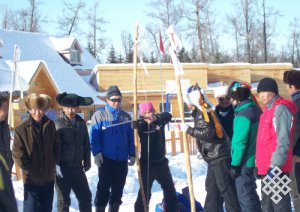 Tuvan people were ancient hunters and nomads and could be traced back to the Tang Dynasty. The Tang Dynasty book "Tongdian” describes Tuva as "Skiing Hunter”. And, in the Yuan Dynasty, Tuvan people were called "Forest People” who lived their free mobile life around Yenisei River, Altai Mountains, and Sayan Mountains. According to Chinese historical records, they were hunters and nomads until the Qing dynasty. Tuvan people have been under the rule of different dynasties and durig the wartime they have been temporarily recruited to the imperial army as the top soldiers due to their superb archery techniques. In 1758 Chinese took control over the entire region of Tuva. From around 1860 Russian settlers came into contact with Tuvans. Under the huge impact of the revolution of 1911 in China, Tuva declared independence from China in 1912. In 1944, Tuva was included into the Russian Soviet Federal Socialist Republic as an autonomous oblast.
Tuvan people were ancient hunters and nomads and could be traced back to the Tang Dynasty. The Tang Dynasty book "Tongdian” describes Tuva as "Skiing Hunter”. And, in the Yuan Dynasty, Tuvan people were called "Forest People” who lived their free mobile life around Yenisei River, Altai Mountains, and Sayan Mountains. According to Chinese historical records, they were hunters and nomads until the Qing dynasty. Tuvan people have been under the rule of different dynasties and durig the wartime they have been temporarily recruited to the imperial army as the top soldiers due to their superb archery techniques. In 1758 Chinese took control over the entire region of Tuva. From around 1860 Russian settlers came into contact with Tuvans. Under the huge impact of the revolution of 1911 in China, Tuva declared independence from China in 1912. In 1944, Tuva was included into the Russian Soviet Federal Socialist Republic as an autonomous oblast.
Distribution of Tuvans in China
Nowadays, Tuvan people are scattered in Xinjiang of China, Outer Mongolia and Republic of Tuva. Chinese Tuvans are mainly living in the three villages: Kanas, Hemu and Baihaba, with a total population of around 2500. Academically, Tuvans are defined as cross-national ethnic group. From 1954 to 1979, the Chinese government launched the long-term "National Identification” campaign and identified 56 ethnic groups. And the Tuvans have been classified as Mongolians in China. Tuvan language in China belongs to Turkic language without the written system.
Some of Chinese Tuvans believe they should be identified as separate Tuvan ethnic minority instead of belonging to Mongolian people due to their unique language and history. Accordingly, most of them try to keep the Tuvan identity instead of developing Mongolian identity.
Challenges and risks
 Paradoxically, with the rapid development of tourism, local government vigorously propagandized the Tuvan identity to attract tourists who are so interested in those "mysterious people” rendered by mass media. But huge profit was grabbed by influx merchant, local government and interest groups. However, Chinese Tuvans were prohibited from conducting tourism in any forms. Tourism led to forced settlement, illegal occupation of grasslands, pauperization and poor medical condition. And yet, most of Chinese Tuvans lack the consciousness of protecting their own rights and interests by legal means. Although some Chinese Tuvan elites have launched collective petitions several times, the problems still remains. Hence, Chinese Tuvans’ crisis and embarrassment of identity have thrown them into confusion and greatly impacted their own ethnic mentality, health and ethnic situation. And now they are involved in the sufferings of hunting prohibition, sedentarization and tourism. Under the huge impact of forced migration and sedentarization, the mobility and interactive relationship between Tuvan people and the nature is being alienated from each other. Thus, a series of spiritual and cultural disorders has appeared in Chinese Tuvan society, such as alcoholism, crime, suicide, pauperization, the rupture of the marriage circle, depopulation and cultural rupture, etc.
Paradoxically, with the rapid development of tourism, local government vigorously propagandized the Tuvan identity to attract tourists who are so interested in those "mysterious people” rendered by mass media. But huge profit was grabbed by influx merchant, local government and interest groups. However, Chinese Tuvans were prohibited from conducting tourism in any forms. Tourism led to forced settlement, illegal occupation of grasslands, pauperization and poor medical condition. And yet, most of Chinese Tuvans lack the consciousness of protecting their own rights and interests by legal means. Although some Chinese Tuvan elites have launched collective petitions several times, the problems still remains. Hence, Chinese Tuvans’ crisis and embarrassment of identity have thrown them into confusion and greatly impacted their own ethnic mentality, health and ethnic situation. And now they are involved in the sufferings of hunting prohibition, sedentarization and tourism. Under the huge impact of forced migration and sedentarization, the mobility and interactive relationship between Tuvan people and the nature is being alienated from each other. Thus, a series of spiritual and cultural disorders has appeared in Chinese Tuvan society, such as alcoholism, crime, suicide, pauperization, the rupture of the marriage circle, depopulation and cultural rupture, etc.
Cultural rupture
Most informants told me that before the implementation of forced settlement and tourism as a result of Cultural Revolution they could freely conduct hunting and nomadic life in the forest and grasslands. Especially, in the long tough winters they survived by relying on their hunting activities. Chinese Tuvans were skilled 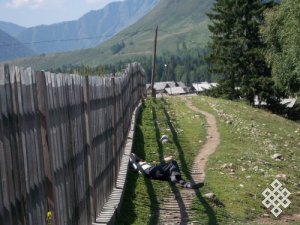 hunters who have been deeply attached to hunting activities, through which not only they could survive and get some extra income but they also enjoyed the happy feeling of freedom and getting along with the pure nature. At the same time they were also the genius zoologists and ecologists, as it was defined by the modern scientist who got acquainted with the abundant knowledge of nature and animals.
hunters who have been deeply attached to hunting activities, through which not only they could survive and get some extra income but they also enjoyed the happy feeling of freedom and getting along with the pure nature. At the same time they were also the genius zoologists and ecologists, as it was defined by the modern scientist who got acquainted with the abundant knowledge of nature and animals.
Ironically, fulfillment of restrictions on hunting and tourism not only couldn’t effectively protect the animals and environment but in contrast led to migration of animals to Russia or Outer Mongolia as a result of "man-made disaster”, such as tourism. Chinese Tuvans came to sad tears when they saw the large escape of animals that were their best friends as well as the origin of happiness and bailment of spirit. In Chinese Tuvans’ cosmology and categorical system the nature and animals have been unconsciously placed at the center of the world instead of human beings. Animism is predominating in their minds, behavior, beliefs and attitudes towards life and death. The more the economy develops, the more powerful this kind of local value system becomes. As they said, forced settlement, tourism, restrictions on hunting and anthropocentrism have offended the God of nature. Human beings will pay the cost and will be punished one day. Sadly, the whole worsened atmosphere has impacted the traditional culture of Tuvans tremendously in China through the social issues like alcoholism, crime, suicide and so forth.
The rupture of traditional Tuva medical culture
Shamanism was the prevailing folk religion of Chinese Tuvans before Culture Revolution with strong traditional practice of shamanic and folk medical system, but even now shamanism is also incorporated into their own belief system. However, under the huge impact of the Cultural Revolution and modernization, Chinese 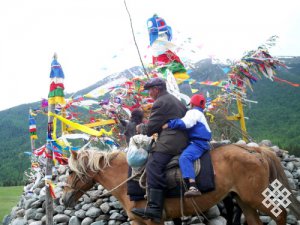 Tuvans’ pluralistic medical system had been undermined tremendously.
Tuvans’ pluralistic medical system had been undermined tremendously.
Since the Tang Dynasty, Tuvan people put multiple health care systems into their practice including secular and sacred systems. At that time Shaman was part of the honored class and possessed a huge amount of privileges and vital resources through which the traditional culture was fulfilled by practice. Meanwhile, lots of miraculous healing stories have been circulated widely among them for eulogizing the magic power employed by the shaman whom average people treated as the almighty person. Nowadays, Shamans have been replaced by Lamas who are believed to be the people who have lost the magic power attributes to Shaman and been infamous by profit rather than belief oriented under the influence of tourism and modernity. Accordingly, most Chinese Tuvan people already have given up seeking treatment from the incompetent Lamas.
Traditionally, family has been a crucial locus of heath care. Self treatment was conducted under the guide of the Shaman, family sage or the traditional herbalists who appertain to indispensible part of folk medical system, through which self treatment knowledge imparted to ordinary people. At the same time, the public healing ceremony also played the important role of educating across the vivid means which were called experimented methods mostly. So, this kind of rich sources of accessing medical care rendered longevity more available for Tuvan people then than now demonstrated through some stories of longevity of Tuvans in the past. However, the story had been changed since the commencement of the Cultural Revolution and modernization.
However, currently, not only poverty but psychological issues dominate across the Tuvan society in China in view of the absence of shaman system and fresh involving the dilemma of modern medical care system due to the simple medical care condition.
Yet, traditionally, as for Tuvan people, psychological health is the most important origin of happiness connected with nature, mobility, belief and so forth but easily tolerating with the physical pains. To some extent, as the old Tuvans said, traditional treatment is not so much as a way of getting rid of physical pains as a channel of psychological comfort.
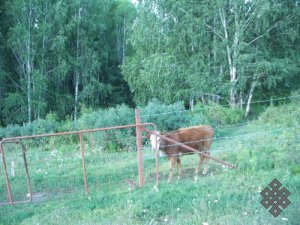 But, the "large ethnic group” such as "Tibetan people”, "Uighur people”, and "Hui people” also relatively remained the pluralistic means of obtaining healthcare. It is the proof of priority owned by big ethnic group than the disadvantaged ethnic one like Tuvan people. Although Tuvan people were classified to the Mongolian ethnic group, the Tuvan identity is maintained by them strongly. Worse still, the small population, shrinking culture and social issues within Tuvan society is pushing them into the predicament gradually. Even they are called the "forgotten people” by academia and others in China.
But, the "large ethnic group” such as "Tibetan people”, "Uighur people”, and "Hui people” also relatively remained the pluralistic means of obtaining healthcare. It is the proof of priority owned by big ethnic group than the disadvantaged ethnic one like Tuvan people. Although Tuvan people were classified to the Mongolian ethnic group, the Tuvan identity is maintained by them strongly. Worse still, the small population, shrinking culture and social issues within Tuvan society is pushing them into the predicament gradually. Even they are called the "forgotten people” by academia and others in China.
Therefore, some Chinese Tuvan people even prefer using alcohol to numb themselves negatively than fighting for physical and psychological issues positively. When I interviewed with some alcoholics, they informed me that they never enjoy drinking in the wake of the disastrous consequences of alcohol abuse but just keen to avoid facing up to the harsh realities through it.
Dilemma of implementing policy of promoting common development within all ethnic groups in China
Factually, with the rapid development of PRC and especially since the implementation of Reform and Opening Policy come up by Deng Xiaoping, the whole living condition of Chinese people including ethnic groups has been improved tremendously. Nevertheless, the development of GDP of China does not mean the necessary ascension of happiness or wellbeing like other developed countries shown in the world. Certainly, a series of policies proposed by Chinese central government aim to promote the improvement of national wellbeing such as championing a harmonious society or establishing happy China, but, the process of policy implementation demands more than our understanding for granted. James Scott refers to the state simplifications, the basic givens of modern statecraft, 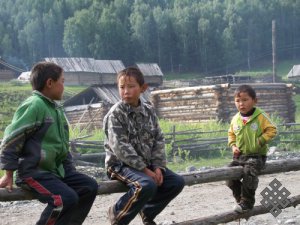 were, rather like abridged maps. They did not successfully represent the actual activity of the society they depicted, nor were they intended to. So, I believe that consciousness of diversity and complicity of society should be crucial part of factors considerations of policy implementation by the Chinese government.
were, rather like abridged maps. They did not successfully represent the actual activity of the society they depicted, nor were they intended to. So, I believe that consciousness of diversity and complicity of society should be crucial part of factors considerations of policy implementation by the Chinese government.
Xiaotong Fei, the late famous sociologist and anthropologist in China, proposed the influential theory of "Plurality and Unity in the Configuration of the Chinese Nationality" in the view of China became a true ethnic group, the Han, during the Qin Dynasty. Afterwards, Han became "a nucleus with centripetal force", with their stable agricultural society attracting and assimilating ethnic nomads from China's northern frontier such as the Qiang. He also pointed out that although ethnic equality and common prosperity is important principle of China’s ethnic policy, the maladjustment to modernity has posed huge challenge to the development of disadvantageous ethnic groups in China and to the balance between survival and cultural protection. Accordingly, seeking harmony but not uniformity is the road heading for tackling the relationship among different ethnic groups in China.
This theory is adopted by the policy of promoting the common development of all ethnic groups and preservation and development of the cultures of ethnic minorities in China. However, action lags behind the development of the policy implications and the mainstream ideology dominated by materialism is greatly challenging the fate of disadvantageous ethnic group like Tuvans in China. To some extent, the local corruption network and conceptual bias turning towards disadvantageous ethnic groups impedes the implementation of central policies hugely related to common development of ethnic groups. Meanwhile, the concept of inequality even existing between the big and small ethnic minorities need to be alerted not only by academia but by policy makers in China owing to the deep impact of material and power oriented on human minds.
Conclusion
Although Chinese Tuvan people have become the sedentary people, the mobile belief still exists in their rituals and daily routine practice,in other words, though the dwelling area of them has been fixed, psychological keen to mobility deeply rooted in their minds. The "hurai” (all the best things) gaining in accordance with the logic of transforming from nature to animals and then to human beings dominates in Chinese Tuvan people’s cosmology that sustains the belief that human beings are capable of receiving the "hurai” and blessing from the nature continently. However, the appearance of contradiction between the symbolic structure and realistic structure implies the efforts of returning the fusion between them by means of rituals and routine practice in the same line.
In fact, the "civilization boundaries” between sedentary civilization and mobile civilization are established by simplism of human beings. Throughout the history and present, the relation between "sedentary” and "mobility” never means opposition but mutually interactive one. Nevertheless, during the progress of national state formation and globalization, when simplified activists and rationalists are trying to implement sedentarization and give the "mobility” savage label, they are triggering another strange "mobility”. Meantime, real mobile people are taking pains to retain and revive the "mobile civilization” and "mobile ideal”, which imply rich wisdom and inspiration for modern civilization.
Hence, I believe with the wantonly development of the idea of the progress of human civilization from sedentarization, the "happiness” of sedentarization, the "disaster” of mobility and the binary of opposition between "mobility” and "sedentary”, not only it has cut off the relationship between human beings and nature, animals and nature, but has spoiled the "good life” of mobile people that was based on the cosmology of naturalism that stems from the juxtaposition and integration between "sedentary” and "mobility”. It could not be explained by the homogeneous theory of simple culture or the clash of civilization. Actually, the "good life” just exists in the "primitive”, "edge”, "between” and "mobility”. When we are desperately seeking for "good life’ and ‘happiness”, yet, we are destroying it around us.
Дата поступления: 06.01.2014 г.
Скачать файл статьи
Библиографическое описание статьи:
Yuxin Hou (China) The Analysis of Current Situation of Tuva people in China [Электронный ресурс] / / Новые исследования Тувы . 2014, № 1 URL: https://www.new-tuva.info/journal/issue_21/6984-hou.html (дата обращения: дд.мм.гг.).

